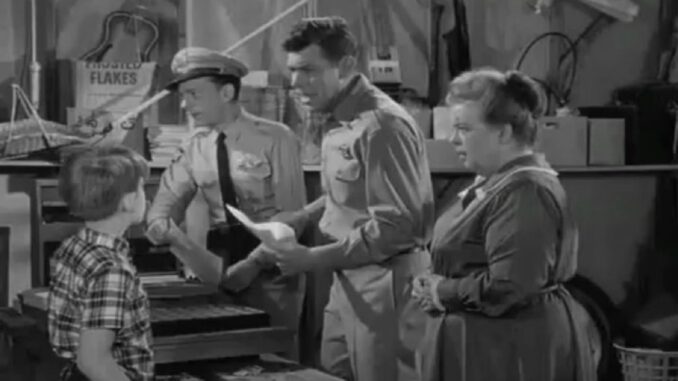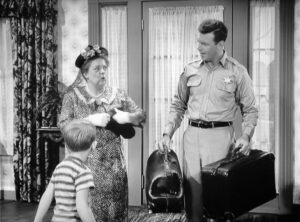
Andy Griffith’s depiction of a rural NC town is immortal. But the show—which premiered 63 years ago this week—only tells part of the story.
Growing up, my father did the same thing every day when he came home from work.
He changed out of his uniform, that brilliant blue Coast Guard blazer, donned sweat pants and a white v-neck, and counted the minutes before “The Andy Griffith Show” came on.
He recorded the reruns to tape and labeled them dutifully. I still remember his small, slanting script. Later, when DVD became a thing, we bought him a comprehensive set. I can’t watch it, can’t hear that whistling theme, without feeling some things. But not all of those feelings are good.
I’m thinking of Andy Griffith because, 63 years ago this week, the show debuted on CBS. In NC, we celebrate it still. The show was filmed in California, but depicts a fictional NC town called Mayberry — based on Griffith’s hometown, Mt. Airy. MT. Airy, a beautiful old quarrying and textile town in the foothills, puts on “Mayberry Days” every year.
For many people of a certain age, Griffith and his popular show are what they think of when they think of NC and the South. Griffith was amiable, dopey, and drawn, but never dumb. He was an unarmed sheriff in a town with simple problems. Sometimes he’d bust up a liquor still. The town drunk checked himself into jail.
Aunt Bee is Andy’s aunt, but everyone calls her “aunt.” Griffith gives the best lines to bug-eyed Barney Fife, played for all the physical comedy by the actor Don Knotts. The laugh track is water under the bridge. Andy is a softie for his little boy, Opie. Opie doesn’t much look like Andy but they both have those staggering ears, like sidecars.

“I don’t want him to be the kind of boy looking for fights,” Andy says when Opie is bullied. “But I don’t want him to run from once when he’s in the right.”
A whole generation of Southern kids hear their parents say things like that. It’s immortal, and very often funny.
But there’s an obvious problem with “The Andy Griffith Show.” It’s not that it’s made for its time. It’s that it wasn’t.
‘I’m an actor. That’s all I’ve ever known.’
From 1960 to 1968, CBS broadcast 249 episodes of “The Andy Griffith Show.”
During that time, the Civil Rights Movement changed policies and laws, if not people. The world feared nuclear annihilation. Martin Luther King Jr. was shot dead on a Memphis balcony. Two Kennedy brothers, one of them the American president, was shot dead too. The war in Vietnam damaged a generation, making them question everything about the way we do things. And NC, Mayberry’s home, was a haven for the Ku Klux Klan.
That’s just the short list.
None of these things broke Mayberry’s serenity. It told some true stories. On the show, Southerners talked slowly, made good food, and told good jokes because we do.
But if there was a war, it didn’t touch Mayberry. There were very few Black people around, and one way to make racial tension easier is to pretend there aren’t other races. As a white Southerner, I can’t say what a Black Southerner saw in it, but the show certainly didn’t see them.
And Griffith, who in the real world grew up sleeping in a dresser drawer, imagined a town where nobody seemed to want for much, even if rural poverty was as much a thing then as it is now.
In real life, Griffith was a moderate progressive. Before his 2012 death, he made an appearance on Barack Obama’s behalf. But there were no politics on “The Andy Griffith Show.” Everything can be resolved with humor and decency. There was no such thing as hypocrisy. There were liars but they usually felt bad about it.
For many, “The Andy Griffith Show” was alive, writ small but glorious. Each episode poses a minor conflict, usually resolved in about 20 minutes. It makes the little questions big.
And that’s part of the show’s appeal, why it endured so long after filming stopped. It’s made for reruns. The plots are so light and small you forget you’ve seen them already. They’re confections.
Which is ok. There’s a place for fantasy. But when some people say “make America great again,” Mayberry is what they’re talking about.
All of it makes the irony tough to look at. Nostalgia is nice and pretty but sometimes it lies. In this case, it ignores.
It would be easy to dismiss the whole show, but that would be a shame. NC is, in a word, complicated. And how some of us feel about the show is complicated too. In its rural community, its general kindness and humor, this show is a good story. Or a yarn, as Andy might put it. But only one small part of it.
“I’m an actor. That’s all I’ve ever known and all I’ve ever done,” Griffith said when NC Democrats courted him to challenge longtime Republican Sen. Jesse Helms in 1989.
Indeed, Griffith was an actor, and “The Andy Griffith Show” was a fantasy. It’s ok to enjoy this tv show. I definitely will. But only as a TV show.
